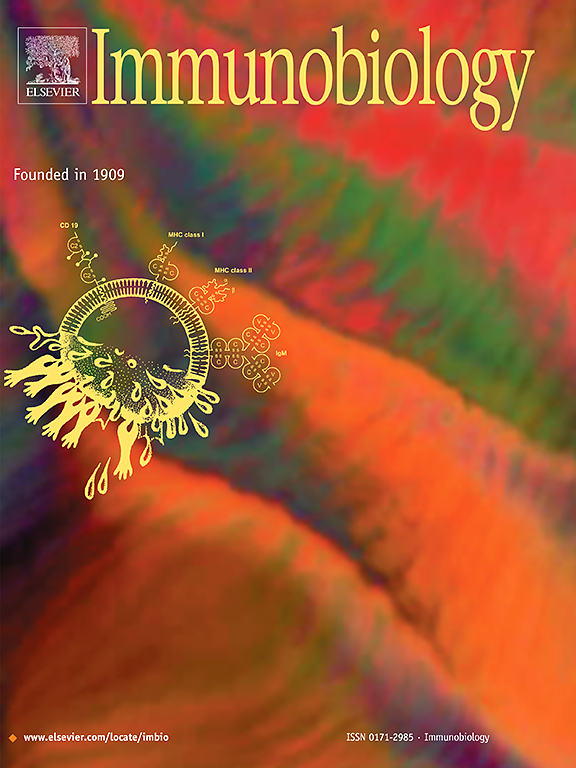Stability testing of HPCs and MNCs from apheresis products
IF 2.3
4区 医学
Q3 IMMUNOLOGY
引用次数: 0
Abstract
Background
Hematopoietic progenitor cells (HPCs) and mononuclear cells (MNCs) are critical components of cell-based therapies, including bone marrow transplantation and regenerative treatments. Evaluation of the characteristics of these products during collection, storage, and transport is essential for maintaining cell viability and functionality. In this study, we evaluated the functional and molecular stability of samples collected for the evaluation of fresh HPC and MNC products. The samples stored at 4 °C for up to 4 days and were evaluated using white blood cell (WBC) counts, flow cytometry, and bulk RNA sequencing (RNA-seq) across five time points.
Methods
HPC samples from seven products (June–December 2022) and MNC samples from six products (October 2022–August 2023) were analyzed on days 0 through 4 after collection. WBC counts were measured, and viability was assessed using 7-AAD staining and flow cytometry. HPC samples were stained with antibodies against CD34, CD3, CD19, CD56, CD14, CD16, CD15, and CD45, while MNC samples were stained with antibodies directed to CD3, CD4, CD8, CD19, CD56, CD14, CD16, CD15, and CD45. Total RNA was isolated from each sample and subjected to bulk RNA-seq to assess transcriptomic changes during storage.
Results
While WBC counts varied between products, no significant differences were observed across time points within individual products. Flow cytometry markers remained relatively stable over time in both HPC and MNC samples, although greater variability was observed in HPCs. A modest decrease in lymphocyte percentages was noted at later time points, primarily driven by a reduction in CD3+ cells; however, these changes were not statistically significant. Cell viability declined significantly over time within individual products and showed inter-product variability. RNA-seq analysis revealed stable gene expression profiles in MNC samples across all time points. In contrast, HPC samples exhibited notable transcriptomic changes as early as day 1 of storage at 4 °C, indicating greater molecular instability.
Conclusion
WBC counts and flow cytometry markers remain stable for up to 3 days in samples collected from fresh HPC and MNC products when stored at 4 °C, although cell viability progressively declines. However, RNA-seq data reveal early transcriptomic changes in HPC samples, suggesting that immediate evaluation of these samples is critical to preserve their molecular integrity and functionality. These findings support the feasibility of delayed phenotypic analysis but emphasize the need for prompt molecular assays in HPC-based applications.
血浆中HPCs和MNCs的稳定性试验
造血祖细胞(HPCs)和单核细胞(MNCs)是细胞治疗的重要组成部分,包括骨髓移植和再生治疗。在收集、储存和运输过程中评估这些产品的特性对于维持细胞活力和功能至关重要。在这项研究中,我们评估了收集的样品的功能和分子稳定性,以评估新鲜HPC和MNC产品。样品在4°C下保存4天,并在五个时间点使用白细胞计数、流式细胞术和大量RNA测序(RNA-seq)进行评估。方法7种产品(2022年6月- 12月)的shpc样品和6种产品(2022年10月- 2023年8月)的MNC样品在采集后第0 ~ 4天进行分析。测定白细胞计数,并用7-AAD染色和流式细胞术评估细胞活力。HPC样品用针对CD34、CD3、CD19、CD56、CD14、CD16、CD15和CD45的抗体染色,而MNC样品用针对CD3、CD4、CD8、CD19、CD56、CD14、CD16、CD15和CD45的抗体染色。从每个样品中分离总RNA,并进行大量RNA测序以评估储存期间转录组学的变化。结果白细胞计数在不同产品之间存在差异,但在单个产品的不同时间点上没有观察到显著差异。随着时间的推移,流式细胞术标记在HPC和MNC样品中保持相对稳定,尽管在HPC中观察到更大的变异性。淋巴细胞百分比在较晚的时间点略有下降,主要是由于CD3+细胞的减少;然而,这些变化在统计学上并不显著。随着时间的推移,单个产品内的细胞活力显著下降,并表现出产品间的可变性。RNA-seq分析显示,MNC样品在所有时间点上的基因表达谱都是稳定的。相比之下,HPC样品早在4°C储存的第1天就表现出显著的转录组变化,表明更大的分子不稳定性。结论从新鲜HPC和MNC产品中采集的样品在4°C下保存时,白细胞计数和流式细胞术标记在3天内保持稳定,但细胞活力逐渐下降。然而,RNA-seq数据揭示了HPC样品的早期转录组变化,这表明立即评估这些样品对于保持其分子完整性和功能至关重要。这些发现支持延迟表型分析的可行性,但强调在基于hpc的应用中需要及时的分子分析。
本文章由计算机程序翻译,如有差异,请以英文原文为准。
求助全文
约1分钟内获得全文
求助全文
来源期刊

Immunobiology
医学-免疫学
CiteScore
5.00
自引率
3.60%
发文量
108
审稿时长
55 days
期刊介绍:
Immunobiology is a peer-reviewed journal that publishes highly innovative research approaches for a wide range of immunological subjects, including
• Innate Immunity,
• Adaptive Immunity,
• Complement Biology,
• Macrophage and Dendritic Cell Biology,
• Parasite Immunology,
• Tumour Immunology,
• Clinical Immunology,
• Immunogenetics,
• Immunotherapy and
• Immunopathology of infectious, allergic and autoimmune disease.
 求助内容:
求助内容: 应助结果提醒方式:
应助结果提醒方式:


